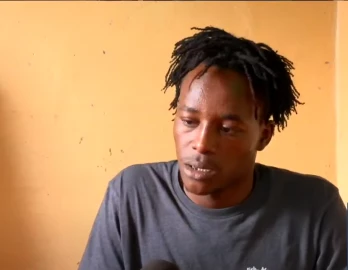O
Ode Francis
Guest
doctype html>

In Nairobi’s Baba Dogo, former hotel chef Mark Clinton Deya has spent three months bedridden after being shot in the thigh during demonstrations. Though initially treated in hospital, he was discharged without follow-up care and now lives with a festering wound.
As the government rolls out a compensation program for victims of recent protests, some survivors continue to suffer in silence, nursing life-altering injuries without access to proper medical care.
In Nairobi’s Baba Dogo, former hotel chef Mark Clinton Deya has spent three months bedridden after being shot in the thigh during demonstrations. Though initially treated in hospital, he was discharged without follow-up care and now lives with a festering wound.
“My leg is still discharging fluids, and I don’t know what will happen,” Deya told reporters. “When I went back for treatment, they asked for 1,100 shillings, which I didn’t have. I thought it would be free.”
A few kilometers away in Jericho, Samuel Omondi faces a similar ordeal. Doctors removed seven bullets from his spine, but one remains lodged in his body. Once a casual worker, Omondi can no longer earn a living and spends most days in pain.
“I thought the check-up would be free,” Omondi said. “But when I went back, the doctor asked if I had paid. In Kenya, nothing is free.”
His aunt, Rosemary Mwajuma, now shoulders the burden of his medical bills. “They took my ID and told me to pay 1,000 shillings every month for his treatment. But his house has been locked up, and we have nothing,” she explained.
The victims say they fear reporting their cases to police, worried they may be branded as criminals. “If you go to a police station, they say you’re a thief. But I haven’t stolen from anyone,” Deya said.
Today, a strip of cloth is all he uses to dress his wound. Once a professional chef, he says his life has stalled. “I just want this wound treated so I can go back to work instead of begging for fifty shillings here and there. Without healing, I can’t even stand to find a job.”
Omondi shares the same hope. “If I could get a job, even in this condition, I would be very happy,” he said.
©Citizen Digital, Kenya
Continue reading...
- In Nairobi’s Baba Dogo, former hotel chef Mark Clinton Deya has spent three months bedridden after being shot in the thigh during demonstrations. Though initially treated in hospital, he was discharged without follow-up care and now lives with a festering wound.

In Nairobi’s Baba Dogo, former hotel chef Mark Clinton Deya has spent three months bedridden after being shot in the thigh during demonstrations. Though initially treated in hospital, he was discharged without follow-up care and now lives with a festering wound.
As the government rolls out a compensation program for victims of recent protests, some survivors continue to suffer in silence, nursing life-altering injuries without access to proper medical care.
In Nairobi’s Baba Dogo, former hotel chef Mark Clinton Deya has spent three months bedridden after being shot in the thigh during demonstrations. Though initially treated in hospital, he was discharged without follow-up care and now lives with a festering wound.
“My leg is still discharging fluids, and I don’t know what will happen,” Deya told reporters. “When I went back for treatment, they asked for 1,100 shillings, which I didn’t have. I thought it would be free.”
A few kilometers away in Jericho, Samuel Omondi faces a similar ordeal. Doctors removed seven bullets from his spine, but one remains lodged in his body. Once a casual worker, Omondi can no longer earn a living and spends most days in pain.
“I thought the check-up would be free,” Omondi said. “But when I went back, the doctor asked if I had paid. In Kenya, nothing is free.”
His aunt, Rosemary Mwajuma, now shoulders the burden of his medical bills. “They took my ID and told me to pay 1,000 shillings every month for his treatment. But his house has been locked up, and we have nothing,” she explained.
The victims say they fear reporting their cases to police, worried they may be branded as criminals. “If you go to a police station, they say you’re a thief. But I haven’t stolen from anyone,” Deya said.
Today, a strip of cloth is all he uses to dress his wound. Once a professional chef, he says his life has stalled. “I just want this wound treated so I can go back to work instead of begging for fifty shillings here and there. Without healing, I can’t even stand to find a job.”
Omondi shares the same hope. “If I could get a job, even in this condition, I would be very happy,” he said.
©Citizen Digital, Kenya
Continue reading...

